The LIT Fund Wants Your Nickels
Radical Transparency and a Long Term Vision For Downtown Theatre
Founded in 2012 by veteran independent theater makers the LIT Fund (recently renamed The Indy Theater Fund) wants to give us—the makers of downtown (independent or off-off Broadway) theatre—money. The creators of the fund want to do this immediately through grants for projects and initiatives, and in perpetuity, through the building of an endowment. Another organization that wants to grant money to people experimenting with new forms and new sounds in theatrical performance is always welcome.
But for anyone who has labored and lost sleep over a grant application, only to forget about it and be reminded of the experience six months later with a rejection letter, two aspects of the LIT Fund’s granting process are especially encouraging: the Fund is interested in expediency and is not interested in adjudicating artistic value. They want to distribute money to independent theatre makers in NYC under a framework they call “radical transparency”—there are no gatekeepers. Money will be doled out quickly without being sifted through an ever-morphing colander of subjective taste.
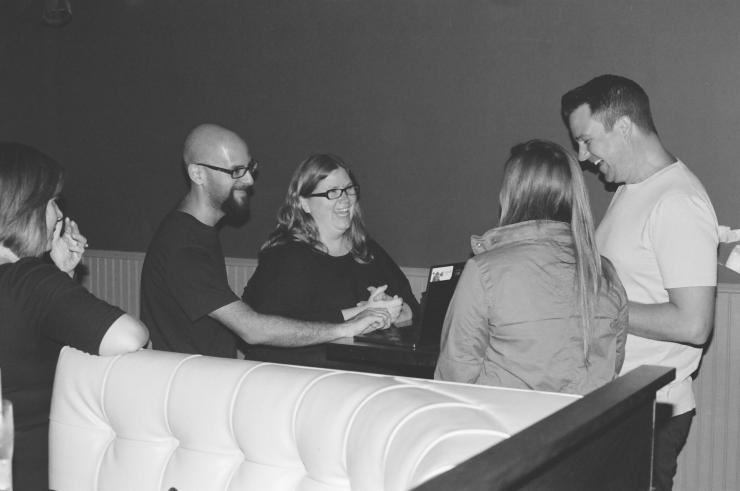
Susan Bernfield, LIT Fund Board Member and Artistic Director of New Georges, notes: “the idea of creating a ‘radical transparent’ funding process is not about adjudicating, or deciding among members of our own community.” Bernfield further explains that the process is a “response to the kind of decision-making that goes on behind closed doors in the traditional funding world, which can seem random or mysterious.”
In the few years since the Fund’s opening, board members have gone about radically transparent funding in different ways. This year they decided to try a new method of fast-track transparency by offering five Community Resource Grants of $1,000 each, specifically devoted to covering artist fees. They decided to raffle these grants off by lottery and write checks on the spot. On Tuesday, October 6 at the Parkside Lounge on the Lower East Side of Manhattan, over a hundred theatre artists—ranging in age from straight-down-from-Bard to Living Theater Veteran, and to judge from a handful of conversations, representing an even wider expanse of aesthetic intentions—gathered for the Lottery. This also became an excuse for LIT to throw a good party and evangelize for the organization.
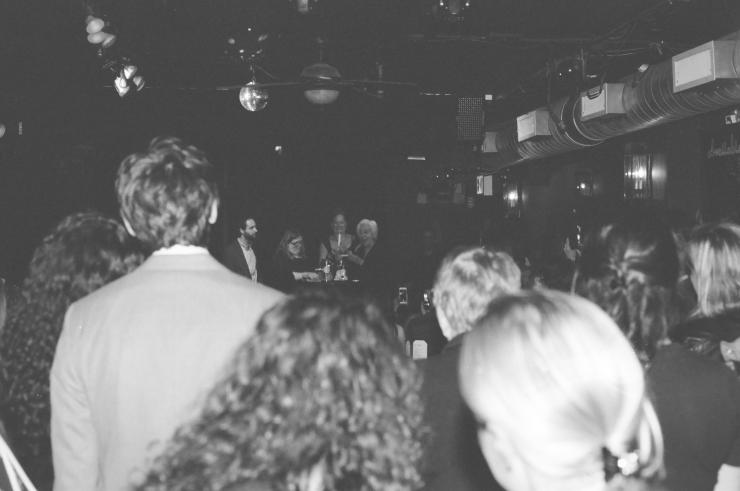
Try to envision an independent theatre landscape in fifty years where resources are plentiful, where arguments are raging over ethical and artistically meaningful distribution of funds, but also over sound and ethical investment.
To get your company’s name read aloud by Olympia Dukakis and tossed in a fishbowl for the Bingo-like lottery, all you had to do was fill out a brief questionnaire in August and join the Fund as a member organization. The simple requirements were that your company, or individual members, had three previous productions in theatres of 99 seats or fewer, and had a production scheduled in the upcoming year in a theatre with 99 seats or fewer. If you wanted the advantage of having your name in the bowl three times, you could create a fifteen-second Instagram video promoting your show. These videos doubled the work of garnering attention for the Fund itself. The only vetting the LIT fund did was confirming whether the information the companies provided was true.
The requirement to join the Fund as a criterion of lottery-eligibility has to do with its longer-term goals. Members are obligated to donate a nickel from every ticket sold to the Fund. Beyond their commitment to helping companies on a per-production basis through grants like this Community Resource Grant and their Emergency Assistance Program—i.e. stolen projector, or costumes lost in a flood—LIT board members are also intent on building an actual fund, which grows to guarantee these resources and more will be available for future generations of artists who emerge in our community.
This nickel-per-ticket buy-in is reasonable and manageable even for companies selling ten-dollar tickets. While these nickels will not generate the scale of the endowment ultimately envisioned, a couple hundred member-companies tossing in nickels makes for a nice Fund sofrito—essential to attracting major donor organizations. Events like the Lottery itself—which culled the swirling convergence of mutually unfamiliar downtown performance microclimates, and brought out the regal Olympia Dukakis and indie theatre luminaries Taylor Mac, and Anne Washburne—add to these efforts by increasing the Fund’s visibility in the world of philanthropy giving.
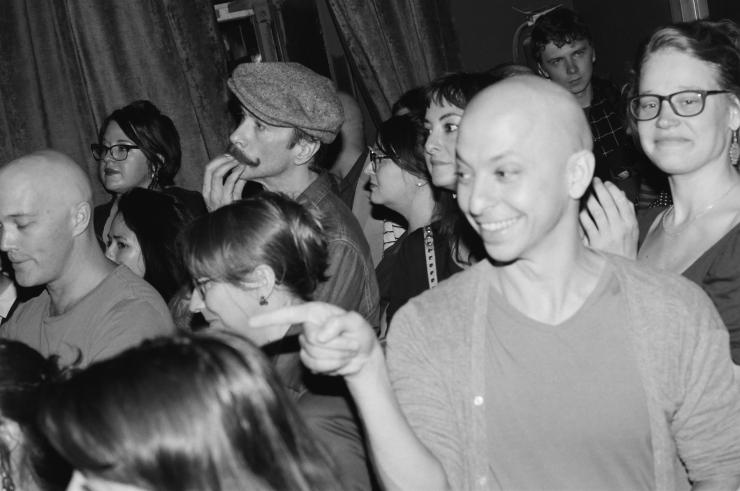
Radical transparency had a lot of people giddy with the random possibility present in the Parkside Lounge on the evening of October 6. There was a wonderful swell of hush followed by a gush of varied releases as each winner’s name was read out. The winners—The Bushwick Starr, Animal Engine, Concrete Timbre, Piehole, and Live Source—represented a healthy cross-section of “established, semi-established, and brand new,” Bernfield observed.
And as people sighed and congratulated, though only a handful of artists and administrators were elated, nobody seemed over-stricken with disappointment. Perhaps this was a consequence of nobody having poured out heart, soul, and a bit of stylized bluster to describe their artistic ethos—something probably better left to reveal its nature in the work itself. When I walked out, a hundred or so makers of varied performance things were still drinking, munching, and talking to new acquaintances about practice and process.
Whatever you think about the “justness” or “rightness” of random giving versus adjudicated giving, this attempt at fortifying community alone seems valuable. Try to envision an independent theatre landscape in fifty years where resources are plentiful, where arguments are raging over ethical and artistically meaningful distribution of funds, but also over sound and ethical investment. A roomful of avant-garde theatre makers debating the least unethical ways to be actors in the durational tragedy of barely restrained capital markets? It's an odd and exciting thought experiment. The LIT Fund is trying to make this real. If you have a nascent or established theatre company and this prospect entices, start tithing those nickels and join their crusade.




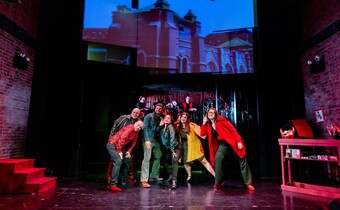


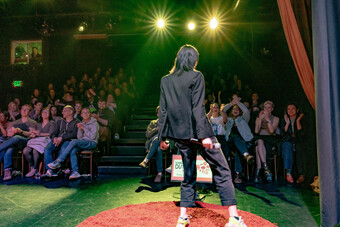



Comments
The article is just the start of the conversation—we want to know what you think about this subject, too! HowlRound is a space for knowledge-sharing, and we welcome spirited, thoughtful, and on-topic dialogue. Find our full comments policy here